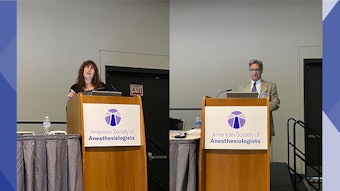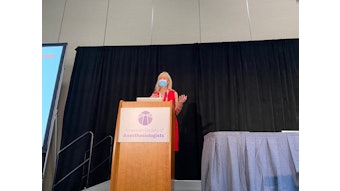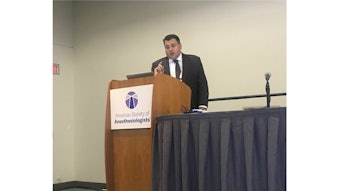Best anesthetic techniques for elderly cancer patients
Point-counterpoint discussion explores if anesthetic management influences chronic pain and cancer outcomes after surgery.

Does anesthetic management influence chronic pain and cancer outcomes in the elderly after surgery? That was the debate for 2021’s session, “Onco-Anesthesia: What Is the Best Anesthetic Technique for Cancer in the Elderly in 2021?”
According to session presenter Miklos Kertai, MD, PhD, a Professor of Anesthesiology at Vanderbilt University Medical Center in Nashville, current studies do not provide consistent and supporting evidence for the benefit of using different types of anesthetic techniques.
“We would consider choosing from the same techniques,” he said. “The decision is based on provider and/or patient-related factors, such as age and comorbidities.”
Dr. Kertai was joined by Juan Cata, MD, an anesthesiologist with MD Anderson Cancer Center in Houston. Dr. Cata presented the flip side of the discussion during the point-counterpoint session, arguing that anesthetic management does indeed influence chronic pain and cancer outcomes after surgery.
Dr. Kertai said there are a number of factors that can increase the risk for chronic pain and cancer recurrence in the elderly after surgery, including:
· Existing chronic pain
· Preoperative opioid use
· Gender
· Catastrophizing tendency (thought focusing – a feeling of being under excessive stress and an anxious tendency)
· The type of surgery and the degree of tissue trauma, such as axillary dissection in breast cancer surgery, video-assisted thoracoscopy versus open thoracotomy, or intraoperative nerve injury
· The severity of postoperative pain and postoperative neuropathic pain
· Surgical complications such as wound infection
When it comes to general anesthesia with total intravenous versus volatile anesthesia for cancer recurrence, Dr. Kertai said there is limited evidence, and that evidence is often contradictory. He cited a study published in Anesthesiology that found inconsistent results among previous clinical and experimental studies in the area.
“This study indicated that there is no significant difference in overall survival and little difference, if any, in recurrence-free survival between total intravenous and volatile anesthesia,” he said.
When it comes to regional anesthesia-analgesia versus volatile anesthesia, Dr. Kertai said the evidence that either of these techniques could significantly contribute to a long-term risk reduction is “very little and often controversial.”
Dr. Kertai cited another study – Sessler et al. published in The Lancet in 2019 – which found that regional anesthesia-analgesia did not reduce breast cancer recurrence after potentially curative surgery compared with volatile anesthesia and opioids. According to the study, “The frequency and severity of persistent incisional breast pain was unaffected by anesthetic technique.”
Ultimately, Dr. Kertai said the reported incidence of chronic post-surgical pain depends on which surgical procedures you’re talking about and which studies you look at.
“For example,” he said, “studies have reported incidences ranging from 50%-85% following limb amputation, 11%-57% following mastectomy, and 30%-55% after cardiac surgery.”
Visit Anesthesiology Today Annual Meeting Edition for more articles.











![Sharks[2]](https://img.ascendmedia.com/files/base/ascend/hh/image/2021/10/Sharks_2_.616369899ebe1.png?auto=format%2Ccompress&bg=fff&fill-color=fff&fit=fill&h=191&q=70&w=340)